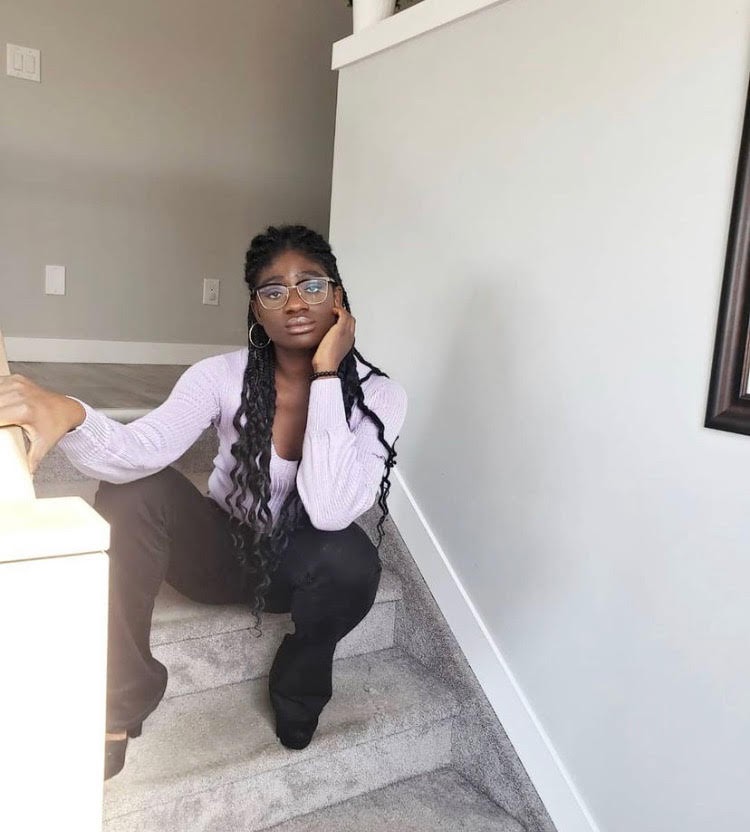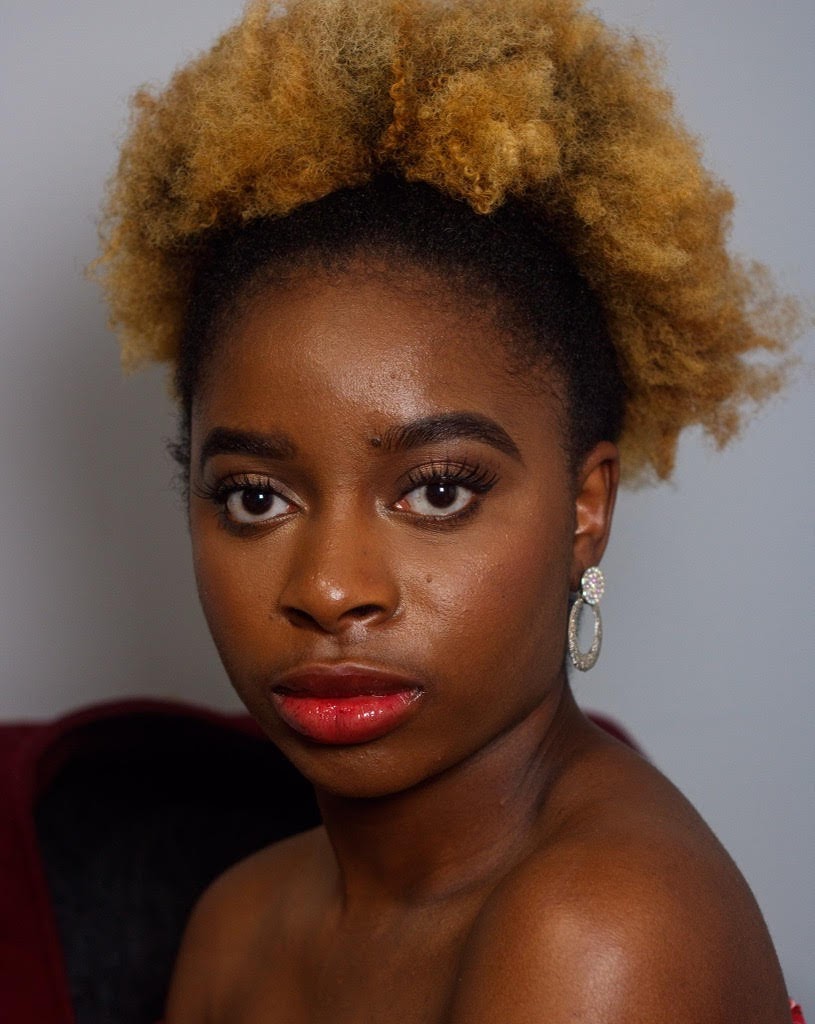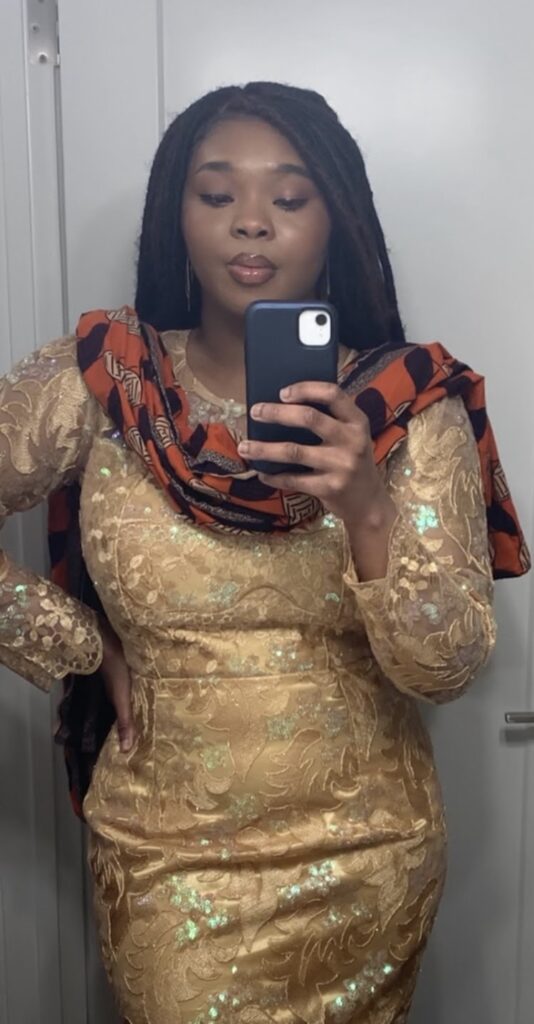by Vanessa Agbulu
For most of my life I didn’t know what my natural hair texture looked like.
My mother began chemically straightening my hair with relaxers when I was 2 years old. Relaxers are creams or lotions that are applied to the hair to straighten it by breaking down the protein structure and loosening the coils or curls. When my roots began to show any semblance of a coil pattern, that meant my hair was due to be relaxed and straightened again. This cycle continued throughout my childhood, the roots grew, my hair was due, my hair was straightened.
When I grew older, my mother passed the torch to me and I continued this tradition myself, roots grew, hair due, straightened. I wasn’t as proficient as my mom when it came to relaxing hair, often leaving the cream on too long which caused my scalp to burn. This left my hair a dried, limp and lifeless ghost of relaxers’ past in desperate need of some TLC.
With the unlimited free time this COVID-19 pandemic gifted me, I decided to invest in taking better care of my hair. I watched video after video on YouTube in an effort to learn a hair routine and I found myself very out of my depth. The women in the videos mentioned pre-shampoos, post-shampoos, detanglers, hair masks, oil sealants, and different black hair types. This made me realize how very little I knew about my own hair. Something I had with me my whole life was somehow incredibly unfamiliar to me.
I decided that I needed to build a relationship with my hair. Even though it took into my 20s, I finally learned how to love my hair. In June of last year, I stopped using relaxers and took better care of it; for the first time in my life, I could finally see my natural hair. I cut my hair and regrew it and I was shocked to discover a thick, full, shiny afro.
This estranged relationship with my hair made me curious about how other black women felt about their own hair. I decided to have conversations with two of my good Nigerian friends now living in Canada, Tolu and Oseyi, about their feelings. We talked about the struggles and challenges they faced while learning to love their hair. We also talked about how living in Edmonton affected their journey and relationship with their hair. And we explored how important a support system was for black girls learning about their hair.
Tolu

My conversation began with Tolu, a 21-year-old student at the University of Alberta (UofA). She’s lived in Edmonton for over a decade and her hair journey has had its ups and downs. When she was younger back in Nigeria, her mother was around to do her hair for her. Although her mother started relaxing her hair when she was 4, it wasn’t done too often, and she was able to maintain her healthy hair. She was able to have a positive relationship with her hair when she had someone there to help her.
But when she moved to Edmonton without her mother, she realized that she had to take care of her hair herself, and began to see it in a more negative light.
She said that like many black women, “we may like our hair, but it can be a lot to deal with sometimes.”
Faced with a dilemma similar to mine, she had to figure out what to do with her hair.
She couldn’t find help from anywhere, including salons.
“Salons here are very expensive and I didn’t know what to do,” she said. But through trial-and-error Tolu learned how to take care of her hair, “I learned that my hair didn’t need too much, just a good shampoo, conditioner and oil, but then again I’m lazy so I just prefer the least amount of steps.”
Tolu also learned how to braid hair and began charging high school friends to do their hair. She isn’t braiding anymore because it was a lot of work with little pay, but she did say that she loved the community that it gave her.
“When I came to Edmonton, all I had was me, myself and I. I didn’t have anyone to talk to about my hair except my sister, but she was just as confused as me.” Finding some humour in her past experience, she continued, “I wish we had a hair hotline or 911 or someone we could’ve called for hair emergencies,” a sentiment I, for one, agree with.
While braiding, she found a support group. “When we were braiding in high school, strangers became friends because we got to talk to each other and know one another.”
Through hair, these girls formed strong bonds, becoming friends and creating a small community, something that she missed after leaving Nigeria.
“In Nigeria, we had our mom, aunties, cheap salons, we had a community, but here we really didn’t have anyone… so we were happy to find a sisterhood we could share experiences with.”
After Tolu graduated high school, she stopped relaxing her hair, a decision that was catalyzed by outside influence. Many major decisions she’s made about her hair were influenced by the opinions of others. When her hair was relaxed, people would compliment her long straight hair which motivated her to continue using relaxers. But then the natural hair movement started around the late 2000s, a result of civil rights protests and increased conversations on anti-black racism, relaxers fell out of favour. Tolu began getting comments from people encouraging her to stop relaxing and to go natural. Friends made negative comments about her relaxed hair, so she gave into the pressure and stopped relaxing.
But still outside opinions made her second guess this choice. “It wasn’t just family and friends that affected me. I remember when I was in high school, one of my friends who was natural got her hair braided with extensions. My white teacher told her how much he loved the braided hair over her other hair… as in he liked hair that wasn’t even hers, over her own hair! This pissed me off, but it also showed me how the world viewed black hair, especially when it was natural… Our hair is seen as uglier or less presentable or not as nice.”
Language around hair length also affected her views on her hair. She stated, “black people associate length with health,” so when she started transitioning to her natural hair, she refused to cut the relaxed ends because she was petrified of having short hair.
But today she’s grown out of that fear after her mother shaved her entire head. She saw that her mom was just as beautiful after cutting her hair. This made Tolu realize that hair didn’t define a black woman or her beauty and motivated her to want to shave off her own hair. Tolu ended our talk by saying, “it’s just hair, do whatever you want with it… shaved dyed, whatever, do want you want! It doesn’t matter what anyone thinks.”
I recall having similar fears as Tolu about short hair. When my hair was relaxed, it was long, and I often got compliments just like her. Once in Nigeria, I had a woman ask me for advice on how she could grow her daughter’s hair as long as mine, and to me, this was the ultimate compliment. Even though at the time my hair was the unhealthiest it had ever been, people thought it was healthy because it was long. The outside validation made it hard for me to let my hair go when I stopped using relaxers.
But, last summer, tired of seeing my natural roots with damaged ends, I picked up a pair of scissors and mustered up the courage to cut my hair as the song “I Am Not My Hair” by India.Arie comforted me. When I let go of the relaxed ends, a heavy weight had been lifted, the weight of the hair and the weight of all the outside pressures I carried.
Oseyi

Next, I interviewed Oseyi, a 22-year-old student, also at the UofA, who’s been in Canada for over 5 years. When she was in Nigeria, she was very savvy with braiding her hair and taking care of it herself. Her hair remained healthy, although it had been relaxed since she was 2-years old. She felt that she had a healthy relationship with her hair, but this relationship changed when she first came to Canada. She lived in Ontario first, where she noticed a lot of breakage and hair loss due to the cold weather. She made the decision to stop relaxing her hair, to cut it and to regrow her natural hair.
But with this decision came a struggle with her self-esteem, “I struggled because I always had long hair, and everybody would say how pretty it was and it was hard for me to lose my hair.” After she grew out her natural hair, she also had a hard time with it, especially with comments from her aunties about how her hair looked “unkempt.” She said, “unkempt hair is just a veiled way to say natural hair. Every time they’d see my natural hair, they’d call it unkempt, and ask what I was going to do with it, like my hair in its natural state was never good enough.” Oseyi started internalizing these comments which caused her to have negative views about her hair.
She later learned that she had to change the way she talked about her hair to change her negative feelings towards it. She had to come to a place where she stopped describing her natural hair as unkempt.
She also removed the term “good hair” entirely from her vocabulary. “When black people say good hair, they mean closer to white hair. They mean straight hair or loose curls… They mean long hair. But that’s not what good hair is, good hair is just healthy hair.”
I continued by asking Oseyi to compare how Ontario and Edmonton affected her hair journey. She stated that she preferred Ontario because they had a larger African population, so she had more of a support system. She had classmates, family and friends that she could call on, but here in Edmonton, there was less of that community she could seek help from and the only people she could call were hairdressers. Black salons are a nice place where you get support from a sisterhood of other black women, but as she mentioned, these salons are very expensive here in Edmonton. For instance, depending on the length and size, braids can cost upwards of $300 in some salons. So, this community of support comes at a hefty price.
Oseyi continued by saying that we place too much importance on our hair as black women, “Culturally hair is very important to us, so we’re left with this pressure of having well done hair all the time.”
She remembered never feeling beautiful unless her hair was done. “It took a while for me to realize that hair was just hair, and I was beautiful regardless.”
Apart from our culture around our hair, the way we view hair is very much influenced by Western ideals. According to Oseyi, the idea of “professionalism” in our society is biased against black women with natural hair. “We have to straighten our hair, wear wigs to hide it or do our hair in acceptable styles in order to get and keep a job… or not get kicked out of school.” So, when black women and girls choose to straighten their hair, sometimes it’s just done for survival.
Even the natural hair movement is influenced by Western beauty standards. Oseyi tells me, “when I started transitioning to my natural hair, I’d look for videos of girls with natural hair, and most of the results that would pop up were black and mixed girls with looser and finer hair textures. It was hard for me to find black women with hair just like mine.”
She tried their hair routines and was left disheartened that they didn’t work for her, “After I followed every step and nothing worked, I was left wondering, why my hair didn’t look like theirs.”
After some experimentation, she realized that simplicity was key for her own hair. She only uses a shampoo, conditioner, water, oils and a styling gel, “I keep things simple, my hair doesn’t need too much.”
While I agree that simplicity is important, my current hair routine is a little more complicated than Oseyi’s. For my hair, I usually use a pre-shampoo conditioner, then a shampoo, a deep conditioner, a coil defining cream, a leave in conditioner, then oils. I found that this routine really hydrated my hair and amplified my natural coils.
My journey to natural hair was met with mixed reactions across generations in my family. My brothers were supportive of it with my younger brother often complimenting my hair. Although my decision to stop relaxing wasn’t done for any outside approval, hearing my brother say my hair was pretty, made me realize the change was worth it. My mother on the other hand didn’t seem to like the transition as much. Although she didn’t outright tell me not to do it, her disapproving glances and veiled comments made it very apparent.
My mom often called my hair “bushy,” a term she finally retired after a lot of protest on my end. After she softened her language towards my hair, she somewhat began to soften her views on natural hair, eventually supporting my decision. But I honestly didn’t blame my mom for her initial reaction. Relaxing hair was something she learned from her mom, who learned it from her mom who learned it from her mom. Relaxing was passed down to her and was the only way she knew to take care of hair. When I decided to make a change, it was like I was breaking a tradition.
After my conversation with friends, I was happy to learn I was not the only one that faced challenges in my hair journey or push back from family. Although this pandemic has taken away a lot, including my sanity sometimes, I’m grateful for it because I was able to explore my hair and how other black women felt about their hair. While I’m very new to this journey, I’m glad I have my own community of friends that can help me along the way.


